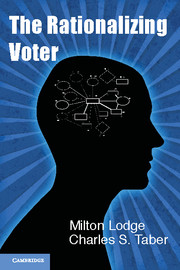Book contents
- Frontmatter
- Contents
- List of Tables
- List of Figures
- Preface
- 1 Unconscious Thinking on Political Judgment, Reasoning, and Behavior
- 2 The John Q. Public Model of Political Information Processing
- 3 Experimental Tests of Automatic Hot Cognition
- 4 Implicit Identifications in Political Information Processing
- 5 Affect Transfer and the Evaluation of Political Candidates
- 6 Affective Contagion and Political Thinking
- 7 Motivated Political Reasoning
- 8 A Computational Model of the Citizen as Motivated Reasoner
- 9 Affect, Cognition, Emotion
- Bibliography
- Index
3 - Experimental Tests of Automatic Hot Cognition
Published online by Cambridge University Press: 05 March 2013
- Frontmatter
- Contents
- List of Tables
- List of Figures
- Preface
- 1 Unconscious Thinking on Political Judgment, Reasoning, and Behavior
- 2 The John Q. Public Model of Political Information Processing
- 3 Experimental Tests of Automatic Hot Cognition
- 4 Implicit Identifications in Political Information Processing
- 5 Affect Transfer and the Evaluation of Political Candidates
- 6 Affective Contagion and Political Thinking
- 7 Motivated Political Reasoning
- 8 A Computational Model of the Citizen as Motivated Reasoner
- 9 Affect, Cognition, Emotion
- Bibliography
- Index
Summary
The central component of our dual-process model and force driving the rationalization of political beliefs and judgments is hot cognition (Postulate 2), which posits that all social concepts thought about and evaluated in the past become affectively charged – positively and/or negatively – and as depicted in Figure 2.1, this affective charge is linked directly to the concept in LTM. These positive and negative evaluative tags come automatically and inescapably to mind within milliseconds of exposure to the object (Postulate 1) – appreciably faster than do conscious appraisals of the object – thereupon signaling the object's affective coloration (Postulate 3). As with Clore and Isbell's (2001) “how-do-I-feel heuristic?” and Sniderman, Brody, and Tetlock's (1991) “likeability heuristic,” this spontaneously evoked evaluative tally becomes immediately accessible information (Postulate 4), which infuses the judgment process from start to finish – from the encoding of information (Postulate 5), its retrieval and comprehension, to its expression as a preference or choice (Postulates 6 and 7). In this chapter we report on three experimental tests that show that many political concepts are hot cognitions whose affective tags are activated on mere exposure to the political leader, group, or issue. Later chapters will document the spontaneous biasing effects of these hot cognitions on what citizen's think and how they reason about the world of politics (Lodge and Taber, 2005; McGraw, Fischle, Stenner and Lodge, 1996; McGraw, Lodge, and Jones, 2002; Taber and Lodge, 2006; Taber, Lodge, and Glather, 2001).
Our focus in this chapter is on “snap judgments” – responses made quickly through the direct retrieval of online tallies, which automatically pop into working memory (WM) where they are “felt” to be good-enough responses in the situation, as when, for example, people tell you how well the president is handling his job without computing a response from recollected pros and cons. We will later turn to the impact of unnoticed affective processing on more deliberative judgments and preferences, as when people are called upon to stop and think before responding.
Information
- Type
- Chapter
- Information
- The Rationalizing Voter , pp. 74 - 93Publisher: Cambridge University PressPrint publication year: 2013
